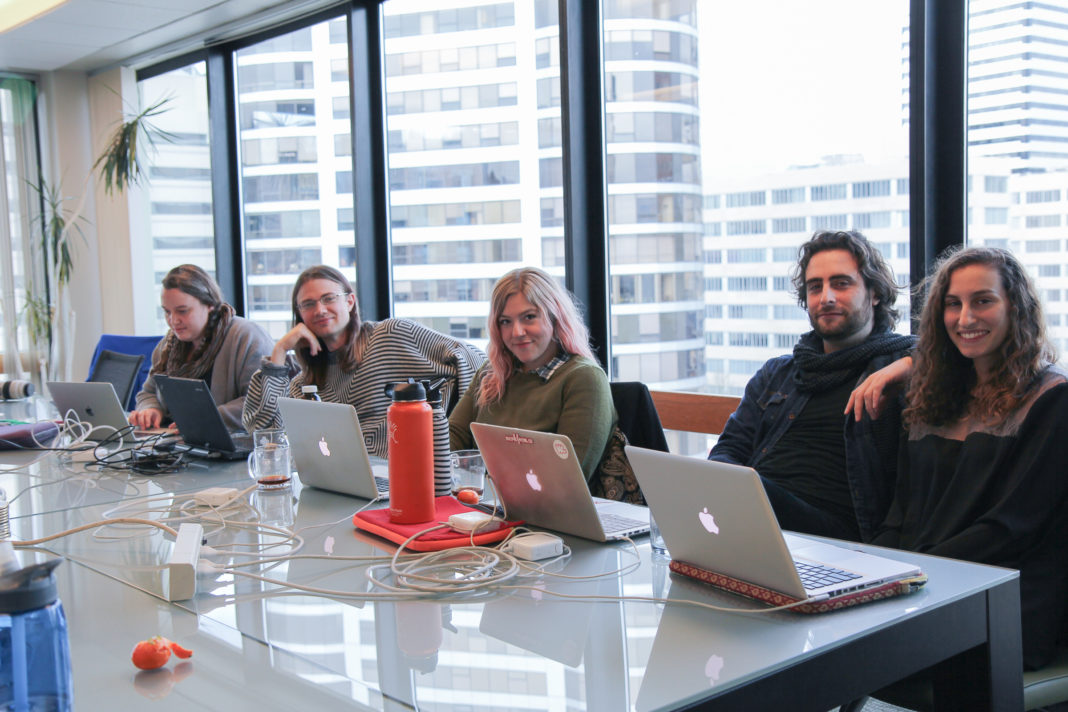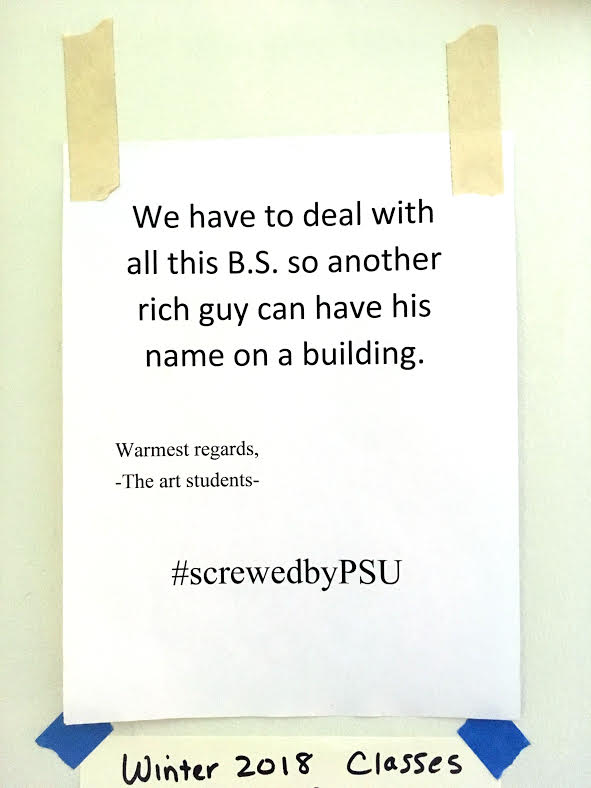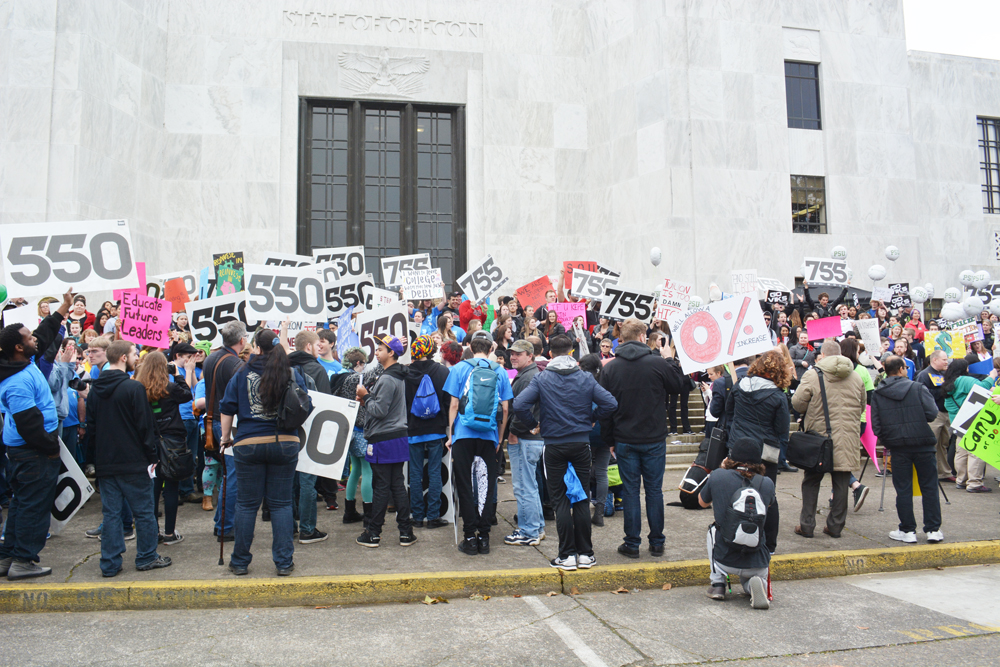After a tense bargaining process and mediation, the Portland State administration came to a tentative contract agreement with the newly-certified Graduate Employees Union after 2 a.m. Saturday, Feb. 16. The contract covers over 800 graduate assistants across campus and will be renegotiated every three years.
If approved by members of the GEU, the contract will be the first between the university and GA’s on campus. While union members described a lengthy and sometimes unpleasant negotiation process, most of the union’s needs have been addressed.
“Although this contract is a compromise,” wrote the GEU in a statement, “there is a lot to be proud of in the work that we ALL did to create a contract that sees immediate monetary benefits for GAs.”
The new contract offers all GA’s a one-time $184 bonus this spring, annual cost of living adjustment raises between 1.5 and 3.5 percent, a doubling of the previous 0.15 full-time equivalent to 0.3, an incremental annual increase to the minimum hourly rate and a gradual increase to mandatory student fee subsidies.
The two parties also agreed to form a joint health insurance working group to generate a report on cost impact, benefits, claims and insurance options before the next round of negotiations.
PSU GA’s make less, spend more on healthcare and rent
“As a [parent] and a student, my issues relate to pay and healthcare,” said a GA at the GEU’s free pancake luncheon on Jan. 31. They did not want their name published. “I am not being paid a livable wage. My pay doesn’t even cover the cost of my childcare let alone housing, food or insurance.”
They continued, “We aren’t given any tangible or standard employee benefits. It feels like we’re being hit on multiple fronts in terms of trying to survive while furthering our education.”
The median monthly salary in 2016–17 for PSU graduate employees was $1,159.95 compared to $1,948 at Oregon State University and $1,747.50 at University of Oregon, according to data the GEU collected in collaboration with the Coalition of Graduate Employees at OSU and the Graduate Teaching Fellows Federation at UO. PSU also offers no health insurance assistance, while OSU and UO cover 88 and 95 percent of insurance fees respectively.
Additionally, according to the GEU, low wages and little healthcare assistance place extra stress on PSU GA’s because rent in the city is 19 percent higher on average than in the rest of Oregon.
Contract will offer some relief but won’t always close the gap
The new contract will help, said doctoral candidate in computer science and GEU bargaining team member Ted Cooper. “I think compared to what is a typical amount of money per GA to get in a collective bargaining agreement, this is a better than average deal.”
However, he added, some GA’s still have to pay quite a bit of money to stay employed at PSU.
The university will remit tuition for up to nine credits per GA, which works out for many graduate employees who can meet their program graduation deadline as a part-time student. However, other graduate students can only meet their graduation deadline as full-time students, as is the case with Laura Lyons, graduate student of public administration.
“[Being full-time] is a necessary condition of their employment,” Lyons said. “Essentially they’re having to pay for the job.”
Cooper said there is some language in the contract that allows individual departments to remit more tuition if they desire, but they are not necessarily obligated to do so.
Additionally, Cooper said, members of the PSU bargaining team presented how much the contract would cost the university if it maintained the same number of graduate jobs every year. However, maintaining this number was not guaranteed in the contract.
“Will the university produce the amount of money in their estimate, or will [it] put less money into it and then force departments to choose to reallocate existing funds to meet the terms of the agreement?” Cooper said. “That’s something we’re really going to have to hold PSU accountable for in the coming months.”
As reported in spring of last year, the stress of budget cuts to individual departments already leads to cutting adjunct faculty in some cases, many of whom face similar financial strain to GAs.
Finally, though a working group will be in place once both parties select members, healthcare costs will not be addressed until the 2020–2021 negotiation cycle. Originally, Cooper explained, PSU wanted to renegotiate its contract with the GEU every five years. It then offered full contract renegotiations every four years and healthcare assistance negotiations every two years.
Both parties finally compromised to renegotiate the full contract every three years.
Until then, according to testimony from other graduate students at the pancake luncheon, most GAs opt into the PSU PacificSource coverage but have found that many healthcare providers do not accept the plan aside from the Center for Student Health and Counseling. In addition, often the deductibles and copays are more than GAs can afford.
A tense negotiation process
“The process was challenging at times,” said Shelly Chabon, Vice Provost for Academic Personnel and Dean of Undergraduate Interdisciplinary General Education in a statement, “but both teams worked diligently throughout the negotiation and mediation process to reach a fair and reasonable agreement.”
The Office of University Communications sent the statement to PSU students, faculty and staff on March 1, two weeks after a tentative contract was agreed on and after Portland State Vanguard requested comment. The statement contrasts the GEU’s account of the negotiation process.
In a December 2017 statement, the GEU claimed during a public bargaining session one member of the PSU administration asked supporters from the PSU Faculty Association and American Association of University Professors to leave the room.
The GEU stated at this meeting the administration decided not to move forward without a mediator due to “GEU’s contact with the media and GEU’s publication to members of PSU’s bargaining proposals as evidence that negotiations could not move forward, despite clear evidence of continuing progress on both sides.”
Later in this statement, GEU claimed PSU’s actions, which the GEU believed could “limit the scope of remaining negotiations,” were retaliation for speaking to the public.
One month after PSU decided to seek mediation and 15 months into the negotiation process, GA in Anthropology Phillip Daily said, “As a student who has been able to come sit in and watch these bargaining sessions, it’s been interesting to see the university respond in a very hostile manner just toward the idea of students just getting basic things I think are just basic human rights.”
Cooper added that members of the PSU administration are “coming to work every day and encountering a lot of difficult, emotional stuff and advocating for a position that is often really bad for the people who have come in and shared their vulnerability.”
During bargaining meetings, several GAs shared anecdotes of their personal struggles with the administration. Cooper added, “There’s no way that cannot be distressing and taxing.”
GEU members will vote on the contract this week. After that, Lyons said she hopes more graduate students join the union. “We need as many people as possible to become members. That’s what gives us power.”






